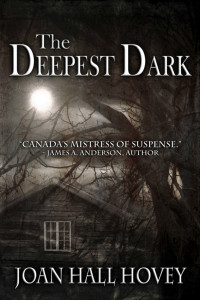Tutor Feature: Joan Hall Hovey and her New Book
Your new book, The Deepest Dark is a true nail-biter. Can you summarize the plot in a few lines?
I’ll give you the blurb on the back of the book:
Following the deaths of her husband, Corey, and ten year old daughter Ellie in a traffic accident, author Abby Miller sinks ever deeper into depression. She contemplates suicide as a way to be with them, and to end her unrelenting pain.
In a last desperate effort to find peace, she drives to Loon Lake where they last vacationed together, wanting to believe they will be waiting for her there. At least in spirit. Barring that, the pills Doctor Gregory gave her to help her sleep, are in her purse.

The cabin at Loon Lake was her and Corey’s secret hideaway, and not even Abby’s sister, Karen, who she is close to, knows where it is.
But someone else does. Ken Roach is one of three men who have escaped from Pennington prison. He and his cohorts are dangerous predators who will stop at nothing to get what they want—and to keep from going back to prison. Having already committed atrocious crimes, they have nothing to lose.
Unknowingly, Abby is on a collision course with evil itself. And the decision of whether or live or die will soon be wrenched from her hands.
What do you love the most about this book?
I love my characters when they’ve told their stories well, whether they are of good hearts or dark hearts. And there are both in my books, which is necessary in any good novel, and especially the suspense novel. As the story reaches its ending a rightness of things should evolve. You can feel it when you’ve achieved that, and that’s always exciting. As it was with The Deepest Dark.
What were some of your greatest hurdles in developing this story?
I’m not aware of any hurdles in particular. But there are always difficulties in the process of writing a book; you can’t avoid it. You are, after all, creating something where nothing has been before. You are creating an entire world and the people in that world must be believable and their stories must keep the reader turning those pages, eager to know what happens next, and unwilling to put the book down until the story ends, and all the loose ends are tied up.
Why did you decide to become an author, and what keeps you coming back to the metaphorical typewriter?
I was first and foremost a voracious reader, as writers generally are. At some point came the compulsion to let my own voice rise from the page. I think writing became for me a way for a shy girl to get attention, and I had a knack for it. There is something about hushing a classroom of students while you read your story aloud, that is exhilarating. I learned I could keep my childhood friends riveted and begging for more, especially with a ripping good ghost story. There is power in that.
As a Winghill tutor, you’ve helped develop the writing skills of countless individuals. What do you think are the most common challenges these aspiring authors face on their road to success?
Believing in oneself. It takes courage to be a writer, never knowing if your work (you) will be praised or ridiculed. We must simply rise above the fear and do what we know how to do when all cylinders are firing. And do it again and again. There is no other way. The challenge is not to give up.
Do you have any words of advice or encouragement for anyone who would like to become an author like yourself?
Never let anyone tell you you shouldn’t pursue your dreams. If you have the drive and even a modest talent, you can do whatever you set out to do. But know it won’t be easy, as anything worthwhile never is. Stay with it. Practice. Write something every day. Read everything you can get your hands on about writing. Read widely and deeply, and most important, devour books written in the genre in which you want to write. Remember that even Shakespeare wasn’t above changing a line if it didn’t get a laugh where it was supposed to, or no one cried at the sad parts. Good writing is in large part rewriting, so expect to do plenty of it. We don’t always get it right first time around.
Lastly, I tell my students not to think too hard. Rather, IMAGINE. Let the story come to you.
Good luck!
Joan’s new book, The Deepest Dark, is available now on Amazon. If you’d like to learn more about Joan, head over to her profile page.




